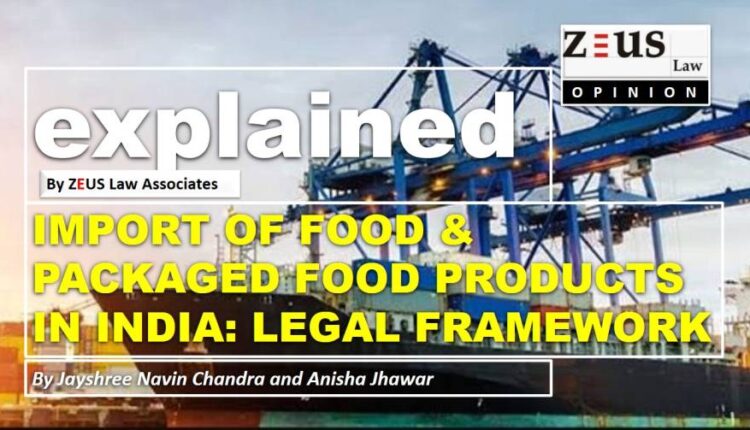Explained: Legal Framework for Import of Food and Packaged Food Products in India
By Jayshree Navin Chandra, Senior Partner & Anisha Jhawar, Associate, ZEUS Law
The new Foreign Trade Policy 2023 (‘FTP-23’) has come into force with effect from 1st April, 2023 with an aim to integrate Indian exporters and importers and for their deeper involvement in the global value chain. The Directorate General of Foreign Trade (‘DGFT’) overlooks the facilitation of the foreign trade in India.
With easy accessibility of different cuisines and types of food made available in India from across the Globe, the younger masses have been increasingly fascinated towards the imported packaged food. The import and sale of food products in India is allowed subject to the FTP-23, in addition to being subject to the domestic laws, acts, rules, regulations, orders, environmental and safety norms, technical specifications which are applicable to the domestically produced goods, including Food Safety and Standards Act, 2006 (‘FSS Act’), Food Safety and Standards (Import) Regulations, 2017, etc. It is mandatory for the importers to obtain an IEC Code (import-export code) prior to commencing of any import activities in India.
Key compliances for import of food items:
- Quality in terms of taste, flavour, texture, nutritive value, etc. and packaging requirements provided under the FSS Act are the mandatory quintessential conditions to be observed before the consignment is allowed for customs clearance.
- Edible food products which are governed by FSS Act, if imported, also need to have shelf-life of not less than 60% of the original shelf life or 3 months before expiry (whichever is lesser at the time of import).
- In case of poultry products, meat and meat products, the goods are required to fulfil certain other compliances, including the sanitary, hygienic requirements as mentioned under the said FSS Act, as well as specific packaging, labelling and quality standards prior to customs clearance. A sanitary import permit is required to be obtained from Department of Animal Husbandry, Dairying and Fisheries, Government of India in respect of import of meat and meat products of all kinds. However, beef, in any form or product containing beef in any form, falls under ‘prohibited’ category for imports, and the consignments imported are required to carry express declarations about the same.
- The import of poultry and poultry products in India are further regulated as per the Livestock Importation Act, 1898.
- In case of primary agricultural products, a bio security and sanitary-phyto sanitary import permit is required as per the conditions of Plant Quarantine (Regulation of Import into India) Order, 2013.
- The import of genetically modified food, feed and other genetically modified organism, living modified organisms are also subject to certain special conditions stipulated under the Environment Protection Laws.
- The import of alcoholic beverages, in addition to being governed under the FSS Act, are also subject to several mandatory requirements of the State Governments.
- All packaged products, if produced / packed / sold in domestic market, are subject to the Legal Metrology (Packaged Commodities) Rules, 2011.
Further, for the import of food in India, certain documents such as ingredients list, specimen copy of the label, declaration about end usage, bill of entry, certificate of country of origin and FSSAI license are mandatory in nature, which are in addition of other conditional documents that are specific to a particular category of food imported.
The packaged food products imported in India need to also disclose the information about the product and the producer, such as – the name, address of the importer, generic/ common name of the commodity, net quantity in terms of standard units, month-year of packaging of the product when it is manufactured or packed or imported, maximum retail price (inclusive of local and all other taxes and charges), consumer care/ helpline information, etc.
India is the second largest import hub and market of food products in Asia and is rapidly emerging as one of the top five in the World. The importers looking at the enormous scope in India to tap on large consumer base, need to be diligent about the procedural nuances as well as statutory compliances and clearances required for import of the food products in India, including packaged food items and ingredients.
(This Article is solely for information purposes, does not constitute legal or professional advisory and should not be relied upon or used as a substitute for legal advice from attorney.)
About the Authors:

Jayshree Navin Chandra, Senior Partner at ZEUS Law, has been a practicing lawyer since 2001 with extensive corporate and transactional advisory experience. She advises and represents clients ranging from Fortune 500 companies to start-ups as well as Central and State Government departments and public bodies in a wide range of domestic and cross border transactions, across industries in practice areas including Corporate and Company Law, M&A and Joint Venture, Private Equity, FDI & FII, Real Estate and Infrastructure, Data privacy and protection, Intellectual Property & Commercial Law Advisory. Ms. Anisha Jhawar is an Associate at ZEUS Law and works in the Corporate and Commercial practice vertical.
 ZEUS Law Associates is an ISO certified full service corporate commercial law firm with a team of dedicated and experienced lawyers well versed in handling domestic and cross border transactions across sectors, jurisdictions and regulatory landscapes. The firm’s practice areas include Corporate and Company Law, M&A and Joint Venture, Private Equity, FDI & FII, Real Estate and Infrastructure, Intellectual Property & Commercial Law, Litigation, Alternate Dispute Resolution, Indirect Tax and NRI Services.
ZEUS Law Associates is an ISO certified full service corporate commercial law firm with a team of dedicated and experienced lawyers well versed in handling domestic and cross border transactions across sectors, jurisdictions and regulatory landscapes. The firm’s practice areas include Corporate and Company Law, M&A and Joint Venture, Private Equity, FDI & FII, Real Estate and Infrastructure, Intellectual Property & Commercial Law, Litigation, Alternate Dispute Resolution, Indirect Tax and NRI Services.



